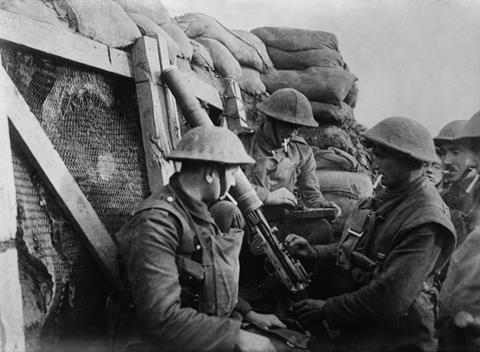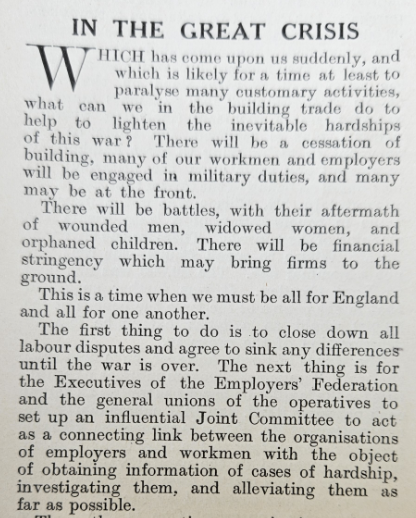The Builder’s coverage in the weeks following Britain’s declaration of war against Germany and Austria-Hungary

There is no sense of impending disaster in the pages of The Builder during the weeks leading up to the outbreak of the First World War in the summer of 1914.
That is not surprising; it was not the job of a construction industry trade magazine to report on the frantic diplomatic manoeuvres of Europe’s great powers in the month that followed the assassination of Archduke Franz Ferdinand on 28 June of that year.

But the significance of Britain’s declaration of war on 4 August was immediately apparent. The Builder’s leading editorial on 7 August compared the event to the Napoleonic wars 100 years earlier. Another warned of a period of “great trouble and anxiety” that could last a generation. “This is a time when we must be all for England and all for one another,” it said.
Far from believing it would all be over by Christmas, reporters and letter writers in The Builder appeared to be bracing for a prolonged war.
The articles below show the magazine’s immediate reaction in the first days of a conflict that would kill nearly one million British people and change Europe forever.
Editorial, 7 August 1914
IN THE GREAT CRISIS WHICH has come upon us suddenly, and which is likely for a time at least to paralyse many customary activities, what can we in the building trade do to help to lighten the inevitable hardships of this war? There will be a cessation of building, many of our workmen and employers will be engaged in military duties, and many may be at the front.
There will be battles, with their aftermath of wounded men, widowed women, and orphaned children. There will be financial stringency which may bring firms to the ground.
This is a time when we must be all for England and all for one another.

The first thing to do is to close down all labour disputes and agree to sink any differences until the war is over. The next thing is for the Executives of the Employers’ Federation and the general unions of the operatives to set up an influential Joint Committee to act as a connecting link between the organisations of employers and workmen with the object of obtaining information of cases of hardship, investigating them, and alleviating them as far as possible.
Then the respective organisations should make use of their local branches to examine into and report on local cases and local needs.
For the moment that may suffice, but as this struggle proceeds plenty of opportunities will arise for mutual help and usefulness.
There is an idea current that a war on this European scale cannot last long, but we have not had a war on such a scale for 100 years, and then the struggle lasted nearly a generation.
The Franco-German War lasted for many months, and unless Germany experiences a fate like Austria did in 1866 we may expect the present war to cause a disturbance of such a duration and of so serious a nature that a period of great trouble and anxiety in the building trade must be faced, and the sooner employers and employed draw together to concert measures for mutual help the better.
Extract from editorial, 7 August 1914
War and Work
THE early years of the nineteenth century saw the close of the Great War which was the aftermath of the French Revolution, which, beginning with the promulgation of the doctrine that all men are born free and equal, was ended by the united efforts of Europe to prevent one of the greatest of the world’s conquerors from becoming the master of the whole of civilised Europe.
A year only separates us from the centenary of the great battle the outcome of which was to bring to Europe the peace which had been denied to it for twenty-five years, and, in spite of the theories of idealists and the growth of democratic feeling all over Europe, we are brought face to face with a struggle which may alter the frontiers of Europe, bringing into being new conditions and changing the course of history.
In the history of nations, as in the life of individuals, there occur epochs in which, to use the picturesque expression, mankind “sees red,” and when nations act like automata controlled by an unseen and compelling will.
It is difficult at present to see that any of the nations of modern Europe can gain as much as they lose by war; it is hard to understand how any one of the five Great Powers can without fear appeal to the arbitrament of war.
…
We cannot yet tell what effect the present situation may have on the internal trade of the country, and more especially on the great industry of building. We shall probably have to face a certain restriction of activity in the field of building of a more or less speculative character; on the other hand, we should expect to see greater harmony prevail between the rival forces of labour and capital, and so adverse external influence may act in a measure for good. Nor shall we be able to import foreign building material with the usual freedom. Our timber supply may be partially curtailed or raised in price, and, if so, an additional impetus will be given to fire-proof construction and methods. The curtailing of foreign supplies of manufactured iron and steel may give us a practical example of the effect of a tariff on manufactured goods, and will certainly afford our manufacturers help by eliminating rivalry and competition.
Such may be some of the results of a political position which is without parallel in our times, and, though we cannot assume the role of the prophet, we think we may be justified in holding that there is no necessity for unmitigated pessimism, as there is none for unwise optimism. It is necessary for the units who compose the nation to work on steadily in their various occupations, and the greatest help to our Government and armed forces is that civilians should pursue their avocations without panic and with energy and determination.
We are continually finding in our daily life that the dangers and difficulties which we anticipate are not those which we actually have to meet, and that there are more things in heaven and earth than are dreamed of in our philosophy.
Letter, 14 August 1914
CORRESPONDENCE.
The R.I.B.A. and the Present Crisis.
SIR, The following suggestions have been made to me of ways in which architects could be of assistance at the present time:-
1. By offering their services to the Government, either collectively or individually, in connection with the building, equipment, inspection and maintenance of temporary barracks, hospitals, etc., or for any other kind of work which they are qualified to perform.
2. By arranging to look after the work of young architects who are already called out or who contemplate joining the Forces.
3. It has also been suggested that a subscription list be opened to enable architects to con tribute as a body to the Prince of Wales’s National Relief Fund.
The Institute is proposing to act in conjunction with the Architectural Association, which is already moving in the matter.
A meeting will be held at No. 9, Conduit-street on Friday, August 14, at 4.30 p.m., for the consideration of these and any other suggestions.
ERNEST NEWTON
(President R.I.B.A.). [** The above letter has been sent to members of the R.I.B.A.- ED.]
Letter, 14 August 1914
Employers and the War.
SIR, As a large employer of labour, a simple manner of rendering assistance in the present crisis has been adopted by us which might be followed by other employers.
We have notified all young unmarried men in our employment that a bonus of £10 will be given to them should they join any of the defensive forces of the country, with reinstatement on completion of military service.
The positions vacated by the young men will be filled up by married men. By this means considerable encouragement will be given to the young men to serve their country, and, if generally adopted, would guarantee full employment for every married man in the country.
O’BRIEN, THOMAS, & Co.
[** The directors of Claridge’s Patent Asphalte Co., Ltd., announce that they are paying to the wives of all men in their employ, who are serving the country in any branch of H.M. Service, the difference between their pay as combatants and their average weekly wages, in addition to keeping their positions open for the men on their return from service. - ED.]
News item, 21 August 1914
WAR AND CONTRACTS
WE take the following from the official Quarterly of the National Federation of �ڶ����� Trades Employers of Great Britain and Ireland:-
Our London Branch has obtained an opinion from Sir Reginald Acland, K.C., from which the following is extracted:-
“Apart from any special contract dealing with the specific point as to war, no subcontractor is entitled to repudiate or to treat any contract as suspended during such time as the country is actually engaged in war.
“As regards any builders being asked to enter into contracts now in pursuance of tenders submitted by them and accepted prior to the strike or lock-out it is eminently undesirable for contractors to sign any such contract until the position as regards subcontractors and also as to the delivery of materials is a little clearer.
“The non-payment of certificates in my opinion comes within the present moratorium.”
More from the archives:
>> Nelson’s Column runs out of money, 1843-44
>> The clearance of London’s worst slum, 1843-46
>> The construction of the Palace of Westminster, 1847
>> Benjamin Disraeli’s proposal to hang architects, 1847
>> The Crystal Palace’s leaking roof, 1851
>> Cleaning up the Great Stink, 1858
>> Setbacks on the world’s first underground railway, 1860
>> The opening of Clifton Suspension Bridge, 1864
>> Replacing Old Smithfield Market, 1864-68
>> Alternative designs for Manchester Town Hall, 1868
>> The construction of the Forth Bridge, 1873-90
>> The demolition of Northumberland House, 1874
>> Dodging falling bricks at the Natural History Museum construction site, 1876
>> An alternative proposal for Tower Bridge, 1878
>> The Tay Bridge disaster, 1879
>> �ڶ����� in Bombay, 1879 - 1892
>> Cologne Cathedral’s topping out ceremony, 1880



























No comments yet